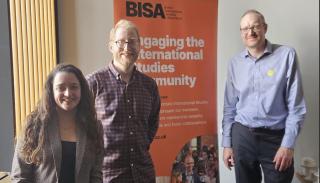Outcomes: ‘Effective peace and security approaches for the UK in a volatile world’

Following the 'Effective peace and security approaches for the UK in a volatile world' roundtable, jointly hosted by the BISA Security Policy and Practice Working Group, Rethinking Security and Kings's College London’s Centre for Statecraft and National Security on 1 May 2025, we bring you the outcomes report from the event.
The event was held at King's College London.
Read the executive summary and download the full report below.
Executive summary
Rethinking security is urgent – not just in the face of concurrent global risks, but because the paradigms we've relied on no longer match the world we’re in. US and NATO security guarantees, and well-functioning multilateral peace and humanitarian response structures, can no longer be taken for granted. Whether the UK’s new National Security Strategy confronts conflict and displacement, democratic decline and anti-democratic forces, climate crisis or technological change, the threats we face are increasingly interwoven, demanding creative responses and joined-up thinking.
The principal threat to UK and European stability is not ‘Cold War redux’ but political –– a networked resurgence of authoritarian and far-right forces opposed to democracy, social solidarity and cohesion. This political challenge does require smart, defensively oriented military preparedness, but it also has vital socio-economic, democracy/governance and (mis)information dimensions. The UK’s security priorities should be to ensure safety, well-being and democracy at home, to uphold peace and cooperation in its wider neighbourhood, and to do its utmost to contribute to peace and human security – and prevent and mitigate ecological crisis – internationally. To remain resilient, the UK needs to ensure its domestic, neighbourhood and global responses are multi-dimensional and reinforce each other.
To manage and reduce instability, the UK’s National Security strategy needs to adopt a ‘peace lens’ and ensure all its capabilities align behind it. There are no purely military solutions to instability; lasting security depends on peace; and peace in turn depends not only on deterring strongmen from using violence to pursue their aims, but also on establishing conditions where people can access safety, justice, livelihoods, resources and services, and where there is inclusive, fair, honest and responsive governance, within an enabling and cooperative multilateral environment. This ‘peace lens’ not only upholds our values – it is also the only viable strategy for protecting the UK by defending social democracy in Europe and restoring international stability.
Cooperation – not just competition – must anchor UK strategy. That means resisting the drift toward purely transactional relationships, and investing in the values, trust and partnerships needed to breathe life back into an embattled multilateralism. To regain the trust of the partners we need, we must bridge the gap between what we say we stand for and how we act, including being honest about our own track record. We must also cooperate pragmatically to breathe life back into multilateralism: working with like-minded countries to sustain the most needed international peace support operations and peacebuilding ecosystems, and fostering teams of both allies and nonlikeminded actors to confront transnational challenges.
The UK must protect its leading expertise on conflict prevention, peacebuilding and democratic security reform. From civil society and research networks to seasoned practitioners and diplomats, we have strong capabilities that we cannot afford to lose in a world that is rapidly fragmenting.
Peace capabilities require consistent, long term financial support and should not be pitted against defence spending. There is a strong case to be made to a receptive UK public on the UK’s role in promoting peace (and reducing forced displacement). Cuts to aid (towards 0.3 % of GNI) and simultaneous increases in defence spending risk leaving the UK with unbalanced capabilities and diminished influence over the challenges underlying instability. The latter also needs to be more closely scrutinised in light of technological change and future threat scenarios, to eliminate waste and ensure smarter spending.
Despite the fragmented mediation landscape, the UK needs to maintain flexible, opportunistic mediation and peacebuilding capabilities for working on disparate peace processes, and making links between local, national, transnational and geopolitical dimensions of conflict. Ending violence often requires cooperating with actors who have played a troubling role. The UK should be proactive in engaging with non-like-minded players to resolve conflict and promote peace, aiming to 3 promote a shared understanding of how to reach stability via more inclusive, legitimate and sustainable peacebuilding processes – drawing on the values and robust evidence underpinning the UK’s approach to peacebuilding.
The UK needs to ensure that its approach to security sector assistance and governance is part of the solution and not part of the problem. Successful promotion of peace and democratic and accountable security reform should be a central objective in UK security assistance partnerships, pursued via high quality monitoring, evaluation, adaptation and learning approaches. Work is needed to restore a common understanding of why and how to promote reform – both across the FCDO, MOD, other relevant departments and among politicians, and among allies via NATO, the OECD etc. The approach should draw on political economy analysis to formulate clear strategies for encouraging change, anchored in support for broad local and national coalitions that can build accountability and push through sustained democratic and accountable security reforms.